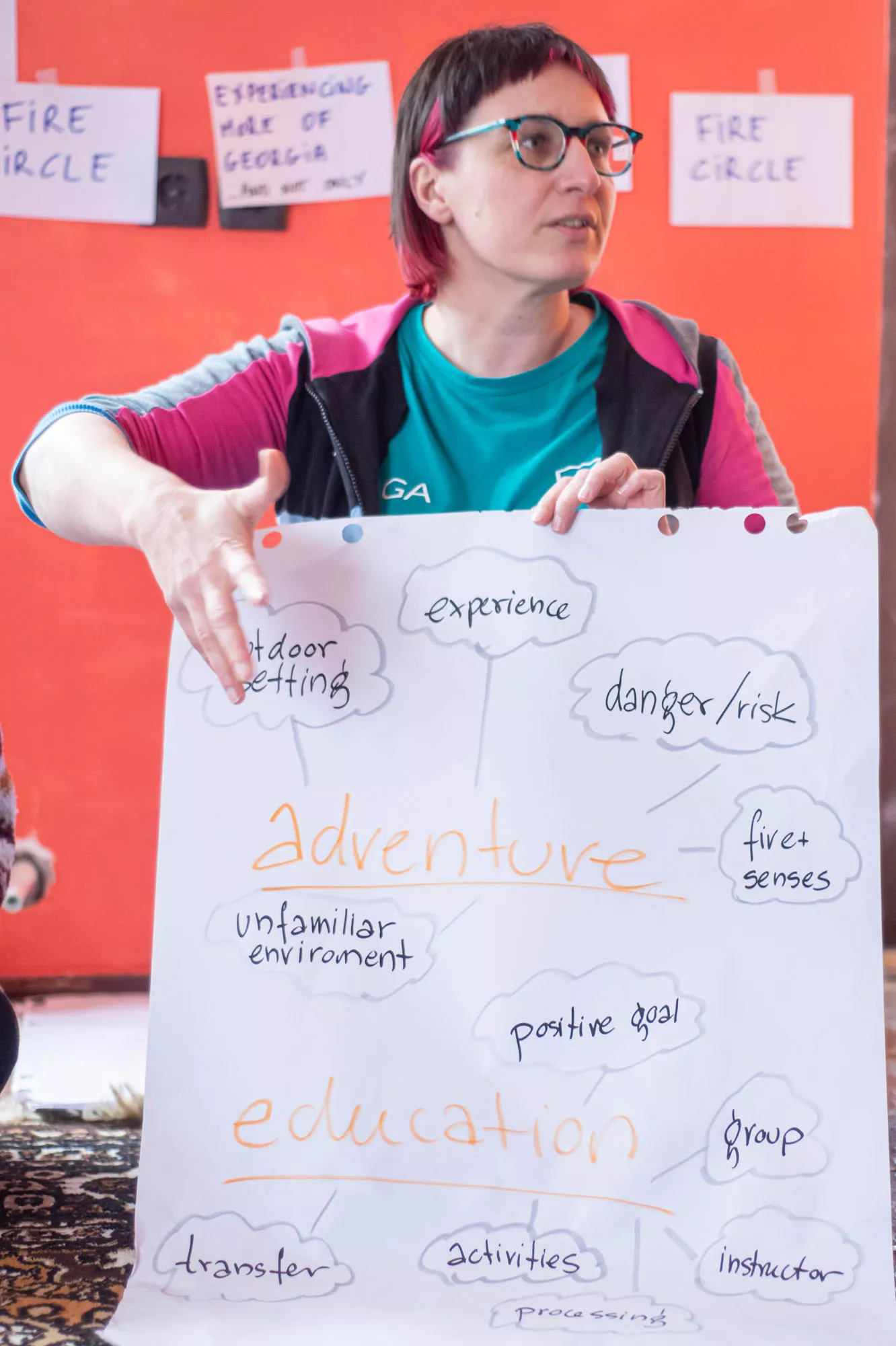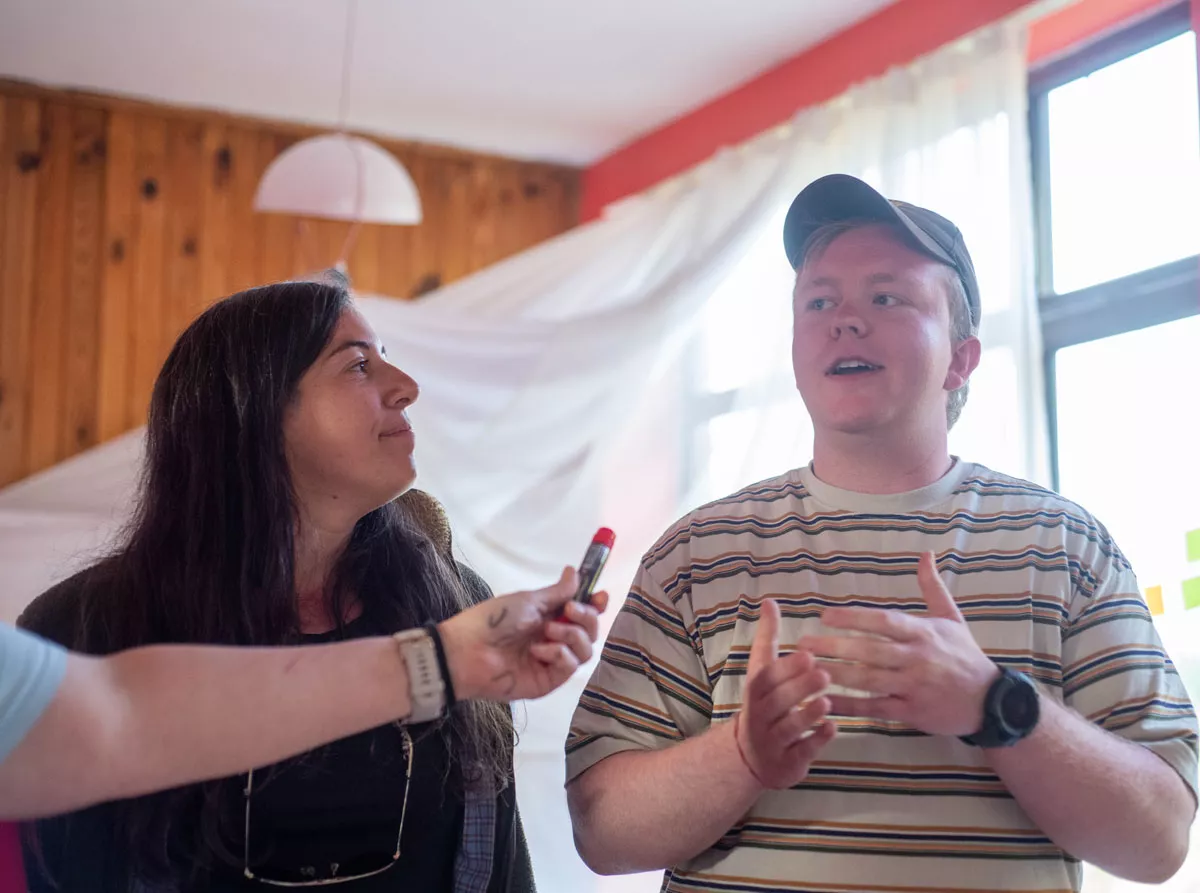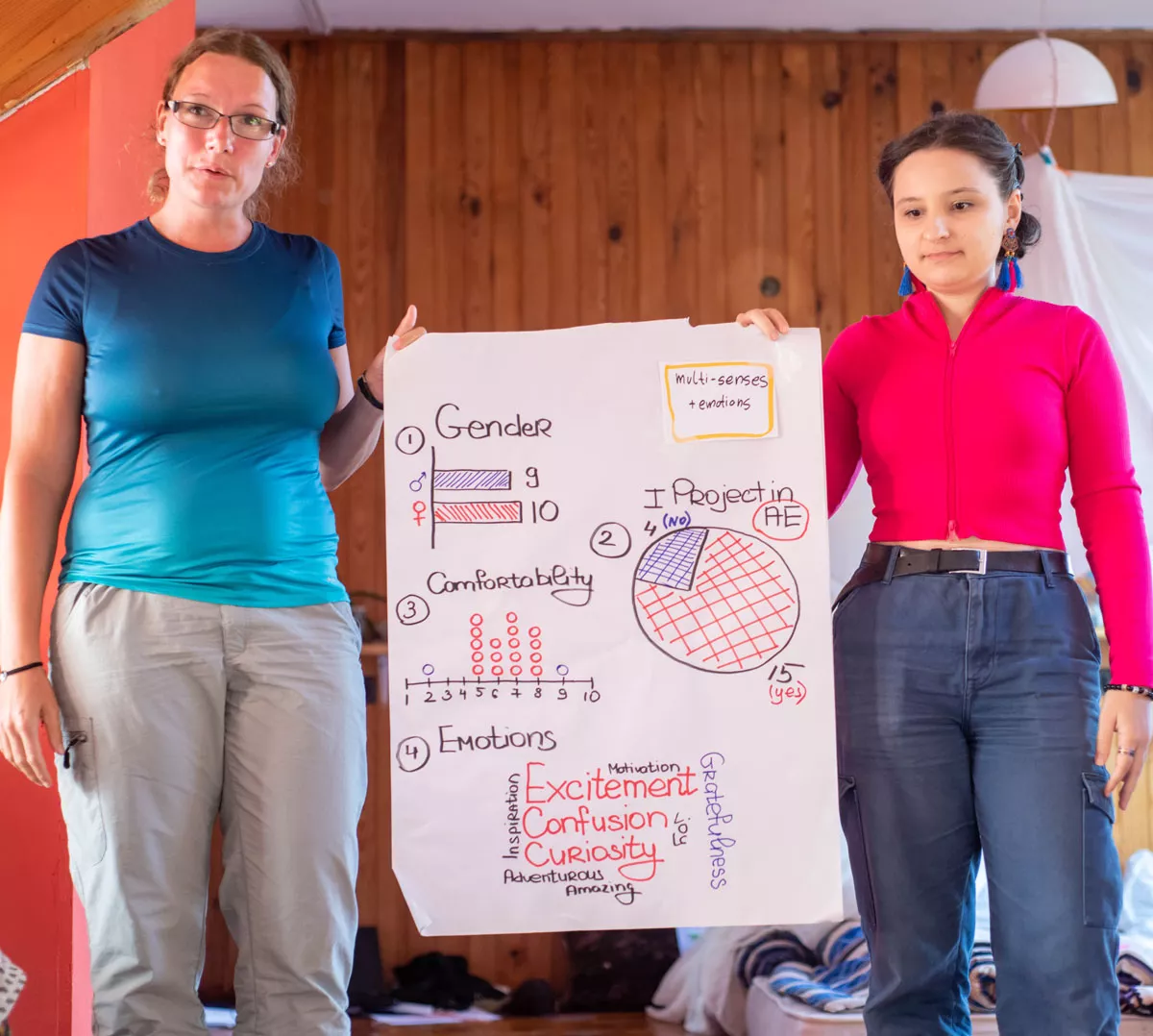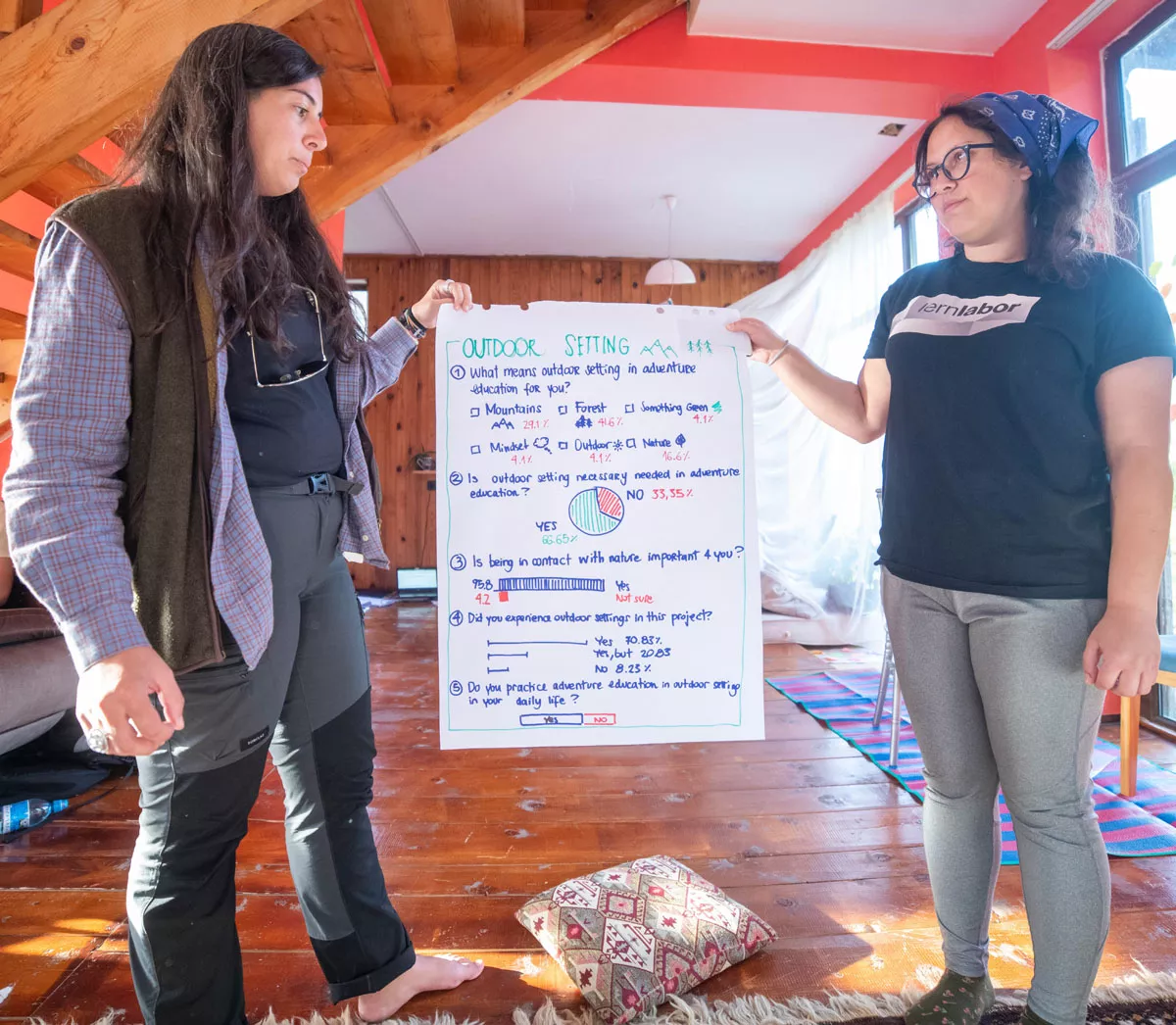A case study of an unusual seminar evaluation
5 min read – like, share, comment!
First published in Polish by Agnieszka Leśny
It took us almost two hours to brainstorm how to summarise the event entitled GOMARDULI ADVENTURE EDUCATION. Methodological and Networking Seminar held in Georgia on 5-7 October 2023. Our international team of facilitators was faced with quite a challenge. We were aware of the fact that:
- we did not have much time to debrief;
- we wanted to do a thorough evaluation and get feedback from the participants;
- participants reported being confused about the seminar topic and needing to sort their knowledge out.
Context
The seminar the SALTO Eastern Europe and Caucasus Resource Centre (SALTO EECA) organised aimed to inspire participants from over a dozen EU and partner countries. It showed how to change the pattern of organising events indoors, in seminar rooms. The initiator of the event, Tomasz Szopa (SALTO EECA expert), explained:
"When I transitioned from a youth organisation to a community of people working on programmes like Erasmus+, I quickly discovered that most events consisted of sitting in a room, in a nicely arranged circle, and having a long discussion. That was not the way I learned. What I was interested in was the process that involved the body and the emotions. So the idea was to organise seminars with EXPERIENCE as the core learning medium".
This year's edition drew directly on the academic concept of adventure education. My role was to help participants understand and reflect on the key assumptions of this approach, how it can be applied, and where to look for reliable knowledge about it. This was not an easy task - there is an ongoing debate among researchers worldwide about the difference between outdoor education and adventure education and how to define the two. To bring order to this chaos, I presented the participants with 11 aspects repeated in the academic definitions. These included learning in an outdoor setting, experiential learning, informed risk and danger management, using all senses and emotions, being in an unfamiliar environment, positive developmental goal, knowledge transfer, structuring experiences, learning through specific activities, the trainer/instructor role and group learning.

Common elements of the different definitions of adventure education are as follows: Gio Bejanishvili.
Throughout the four days, participants continued to ask questions about the difference between the ideas and whether the activities proposed in the seminar all fell within the concept of Adventure Education. Even the team of facilitators were not sure. So we thought, let's check it out!
Active reviewing
After much deliberation, we decided to use the active reviewing approach to delve into the theoretical context of the seminar. We divided the participants into 10 teams (each dealing with one aspect, leaving the 11th to us). Each team had to prepare a mini-survey among the seminar participants on a given topic. Interestingly enough - the instruction was open-ended, i.e. each team had to formulate the research question within the assigned aspect, develop the tool, collect the data and present the results. So, it was not a matter of simply conducting a survey and asking the question: "Do you agree with the statement that experiential learning took place in the seminar? The participants had to go back to the theoretical concepts, think about them in depth, discuss what they found interesting in a certain aspect, operationalise them and carry out the survey. It was their decision whether the survey would be anonymous or not. Was it difficult? Yes, it was! But it was worth it!

Participants debated and developed research strategies and photos.Gio Bejanishvili.
Activity structure
The participants were divided into pairs. They then drew one of the aspects found in the definitions of adventure education. They were given a strict time limit:
- 15 min - discussion in teams
- 15 min - development of research strategy, selection of tools;
- 45 min - carrying out the research
- 30 min - collecting and processing results;
- 30 min - presentation.
Results
The results exceeded our expectations! The participants were truly engaged in the activity. Formulating a research question was the hardest part for them. Still, it was a valuable exercise that helped them internalise knowledge provided during the theoretical session that served as an introduction to the whole event. Once the questions had been formulated, they went on to design a number of interesting tools. Some quickly developed an online survey, others carried out a poll, another group conducted qualitative interviews with a sample of seminar participants, and others used drawings and graphs.
The presentations were also appealing, albeit diverse. Some prepared eye-catching posters with visualised data, and others gave a typical pitch talk (a performance similar to a sales presentation). For some, presenting the data publicly was a challenge, so they read quotes from the interviews and tried to synthesise them. The presentation ended with a focus interview, led by me, in a light-hearted, somewhat cabaret-like format. But it was about the role of the trainer, who gave us feedback.

Interview with the focus group, photo.Gio Bejanishvili.
It is worth noting that there was a lot of evaluation and feedback regarding the results presented to us, the organisers, and other participants in the group. On selected topics, there was both positive and negative feedback.
In 2 hours and 15 minutes, we were able to achieve what was a very ambitious goal in an excellent atmosphere. The participants provided all the "research documents", allowing us to explore issues which were not presented in great detail at the seminar but were of interest.
Allowing participants to ask a research question was extremely refreshing to me. Usually, when you evaluate, you give people a range of answers. We have our reasons, of course. However, I found it valuable to experiment with letting them say what they want to see evaluated. This approach recalls the success criteria (Polish: 'nacobezu' method) known from formative assessment. I was delighted that they had included the elements that were most important to them in their research. I would not have asked them in the design of the evaluation myself. However, there was much more to their contribution, and the whole process enabled a holistic reflection on the design of the seminar and allowed us to answer the following question: Did we really deliver an adventure education experience?

Participants present the results, photo.Gio Bejanishvili.
Possible applications
I recommend the method to all those carrying out comprehensive development processes, which help combine the evaluation with the knowledge or content framework of a training course, a workshop, or a course. It is also an interesting option for academic teachers who could use it as a summary of a certain stage of knowledge acquisition by the students, e.g. as a wrap-up of a course section. It will definitely come in handy in short Erasmus+ projects as a full or halfway summary. I recommend it as well!
Roger Greenaway, the author of the active reviewing technique, often said:
Evaluation should be done in the middle of the course, not at the end. Then, you will know what to change and improve based on the participants' responses. What do you need their suggestions and advice for at the end - when you won't see this group again?

Participants present the results, photo.Gio Bejanishvili.

Participants present the results, photo.Gio Bejanishvili.
dr Agnieszka Leśny – pedagogue and cultural studies scholar, scientifically affiliated with the Faculty of Pedagogy of the University of Warsaw. She works in project mode in various areas of education and business. She specialises in building commitment, effective communication, talent management, working on the team's strengths, and creating and implementing a vision of change in organisations. She uses experiential education methodologies focusing on outdoor/adventure education (adventure pedagogy) and games and gamification. Co-designer of several games, including the first management game about the so-called Gallup talents, "Expedition of Power". President of the Science and Adventure Workshop Foundation. She is pursuing a doctoral project on 'School under sail' cruises.




